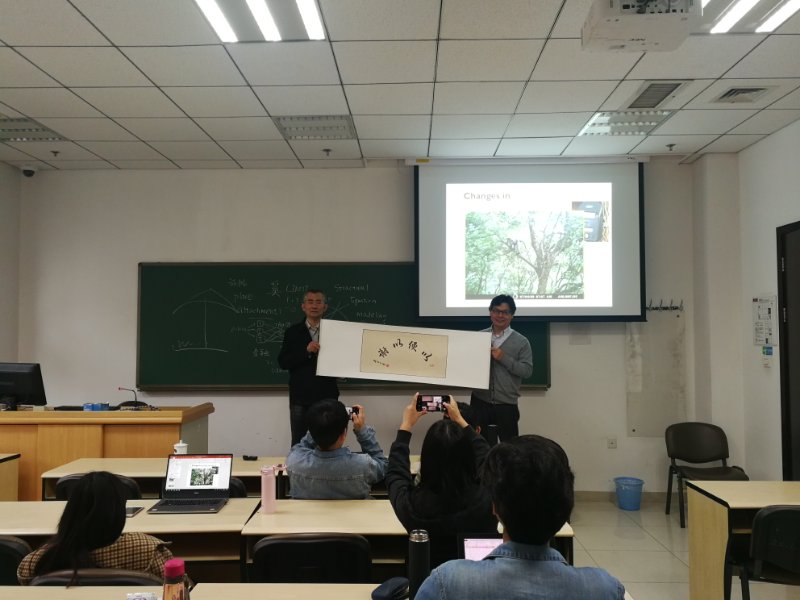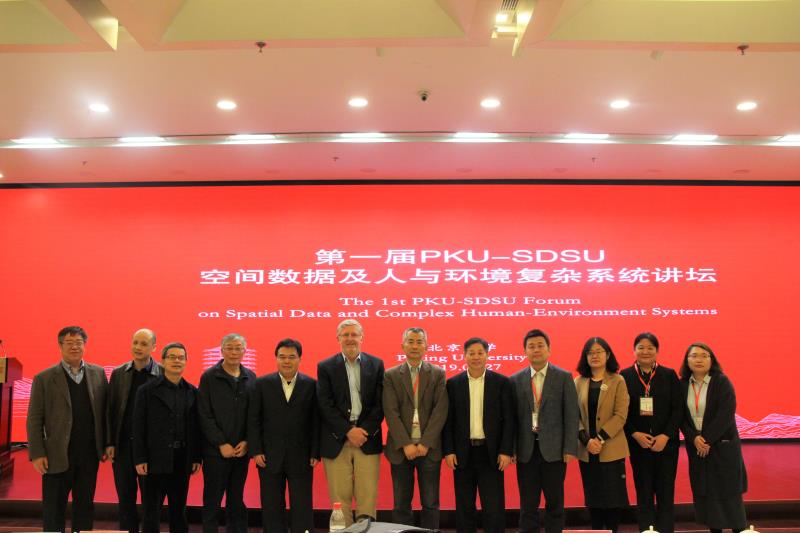News in 2019
• December 17, 2019: A paper led by Dr. Hsiang Ling Chen, titled "Assessing the effects of payments for ecosystem services programs on forest structure and species biodiversity", has been accepted for publication at Biodiversity and Conservation. This paper is based on Dr. Chen's work for our NSF CNH project (2012-2017). Congratulations!
• December 10, 2019: Vice President Stephen Welter, College of Arts and Letters, and Department of Geography all agreed to provide financial support for the CHES Center. The Center will have its office at Storm Hall in the spring 2020 semester, and be relocated to Arts and Letters building from the 2020 summer.
• November 27, 2019: SDSU President de la Torre, Director of SDSU Sponsored Research Contracting and Compliance Sandra M. Nordahl, and Dean of College of Urban and Environmental Sciences (Peking University) Dr. Canfei He have signed a Memorandum of Understanding (MOU hereafter) Regarding the Complex Human-Environment Systems Center between San Diego State University (SDSU), San Diego State University Research Foundation, and College of Urban and Environmental Sciences (CUES), Peking University (PKU). Prior to being sent out for signature, this MOU was sent to California State University Chancellor' office and received approval. This MOU provides terms for collaboration between SDSU faculty and CUES-PKU faculty thorough Dr. Li An's Complex Human-Environment Systems (CHES) Center. The CHES Center, approved in March 2019 by both SDSU and PKU, aims to promote scholarship, education, and outreach in the area of computational human-environmental science, building up the capacity of SDSU and PKU to become leading research universities in human-environmental science. The Center seeks to bring together researchers at SDSU, PKU and beyond to form a cluster of scholars engaged in externally funded, complementary research, integrating human and environment sciences that include ecology, biology, spatial science, geography, sociology, demography, and other related disciplines. In the near future, the CHES Center will play an important role in Dr. Li An's newly secured NSF CNH project "CNH-L: People, Place, and Payments in Complex Human-Environment Systems". The CHES Center has also received financial and space support from Department of Geography, College of Arts and Letters, and Vice President Stephen Welter.
• November 22, 2019: Dr. An et al.'s article "Cascading impacts of payments for ecosystem services in complex human-environment systems" has been accepted for publication. This article builds an agent-based model to study the complex interactions among human livelihoods, payments for ecosystem services, and the Guizhou golden monkey habitat occupancy over 20 years using data from Fanjingshan National Nature Reserve, China. This article is an outcome of Dr. Li An et al.'s previous NSF CNH project and ongoing NSF CNH2 project.
• November 05, 2019: Dr. An et al.'s article "Editorial: Meeting Grand Challenges in Agent-Based Models" has been accepted for publication. This article is the editorial paper of the special issue "Meeting Grand Challenges in Agent-based Complex Systems" in Journal of Artificial Societies and Social Simulation, for which Drs. Li An, Volker Grimm (Helmholtz Centre for Environmental Research, Germany), and B.L. Turner II (Arizona State University) are guest editors. The special issue is an outcome of the NSF sponsored conference "Agent-Based Modeling (ABM) 17: A Symposium That Advances the Science of ABM".
• October 14, 2019: Congratulations to Alexandra (Ali) Yost! Ali led a paper titled "Mechanisms behind concurrent payments for ecosystem services in a Chinese nature reserve" and was accepted for publication in a prestigious journal Ecological Economics (5-Year Impact Factor: 5.207 as of October 14, 2019). This paper explores latent mechanisms underlying enrollment decisions regarding payments for ecosystem services (PES), provides new insight about PES effectiveness, especially interrelationships between concurrent PES programs. Ali is an M.S. candidate at Department of Geography, San Diego State University.
• Septermber 10, 2019: Alexandra (Ali) Yost defended her thesis proposal titled "Assessing effects of a PES program on species richness over time and space" successfully. Ali, M.S. student at Department of Geography, San Diego State University, has been working on data from Dr. Li An's NSF project. Her thesis utilizes "camera trapping data collected in Fanjingshan National Nature Reserve (FNNR) in Southwest China to inform a multi-species hierarchical model to estimate species richness, environmental characteristics of preferred habitat of wildlife, and the effects of human disturbance in relation to participation in a PES program called the Grain-to-Green-Program (GTGP)". Congratulations Ali!
• August 26, 2019: Dr. Li An warpped up his one-year sabbatical leave and returned to San Diego with his family. During his leave in China, Dr. An worked on several papers in addition to starting up his recently funded NSF grant titled "CNH-L: People, Place, and Payments in Complex Human-Environment Systems". Also Dr. An and family visited Taiwan, Hongkong, Enshi (in Hubei Province) and several other places for sightseeing and other purposes within the sabbatical year.
• July 14, 2019: Invited by Drs. Iris Lorscheid and Volker Grimm, Dr. Li An went to Hanover, Germany and attended a three-day symposium (July 10-12, 2019) held at Herrenhauen Palace Conference Center. The symposium, titled "Best Practice in Agent-Based Modeling for Theory Development" is the second part of a series of symposia sponsored by the Volkswagen Foundation, consisting of three symposia taking place over the years 2018-2020 on the topic of "Theory building with ABM". In the first part, the state of research in the connection between theory and ABM was discussed, along with topics such as what the epistemological perspectives are and how theory and ABM currently come together. The second part deals with best practices, covering a range of topics like which methods can support theory development with ABM and how theory can / should find a place in the processes of modeling and model analysis. Around 30 ABM developers and users from Europe and USA attended the symposium.
• May 10, 2019: Invited by Prof Yu Liu, Associate Dean of College of Earth and Spatial Sciences at Peking University, Dr. Li An gave a seminar titled "Space-Time Data Mining: Theory, Methodology, and Applications". Around 25 students from the college and other institutions attended the 1.5-hour seminar. For detail, see the news from Dr. Liu's group.

• April 24, 2019: In response to Prof Li Zhou's invitation, Dr. Li An went to Renmin University and gave a seminar titled "Complex Human-Environment Systems: Commonalities and Uniquenesses". Around 17 students from Prof Zhou's "Methods in Rural Development Research" class at College of Agriculture and Rural Development attended the seminar with enthusiasm, and raised excellent questions about multifinality, equifinality, the 4W (Who, Where, When, What) method, and so on regarding how to effectively explore and understand complex human-environment systems. Towards the end of the seminar, Prof Zhou presented Dr. An a wall scroll with Chinese calligraph °į“‘Ī„“‘–Ľ" £®Ebenezer, a blessing word that stands for triumph or posperity according to Samuel 4£ļ1 in Old Testament£©.

• March 27, 2019: The first PKU-SDSU forum on spatial data and complex human-environment systems was held at Zhong Guan Xin Yuan, Peking University. Organized by College of Urban and Environmental Sciences at PKU, the full-day forum focused on exploring the role of spatial data in advancing complex human-environmment systems research, promoting international and interdisciplinary collaboration, and advancing the new frontier field that aims to understand complex omplex human-environment systems (CHES). The forum attracted around 350 participants from all over China (e.g., people from Peking University, Tsinghua University, Chinese Axcademy of Sciences, Northwest University, Hebei Normal University, Jilin University, and Inner Mongolia Normal University). The seminars are made by seven internationally renowned scholars:
"Modeling complex geographic systems" by Dr. Michael F. Goodchild, Emeritus Professor of Geography at the University of California, Santa Barbara;
"Understanding and predicting the terrestrial biosphere in the anthropocene Era: Where we are, where we need to go" by Dr. Hanqin Tian, Professor at Auburn University;
"Recent trend of air pollution in China: A evaluation based on sectorially resolved emission inventories" by Dr. Shum Tao, Professor at Peking University;
"A new paradigm for analyzing remotely sensed big data" by Dr. Fang Qiu, Professor at University of Texas, Dallas;
"Complex human-environment systems: Commonalities and uniquenesses" by Dr. Li An, Professor at San Diego State University;
"Estimating the pressure of urban shrinkage at a global scale under the shared socioeconomic pathways using cellular automata" by Dr. Xia Li, Professor at East China Normal University;
"Integrating multi-source big geo-Data to understand cities" by Dr. Yu Liu, Professor at Peking University;
The forum culminated with these seven wonderful seminars, followed by enthusiastic discussions about the concepts, theory, and methods in exploring complex human-environment systems.
• March 06, 2019: Dr. Li An's proposal for establishing "Complex Human-Environment Systems (CHES) Center" has been approved by SDSU Deans Council on March 06. CHES is an international research hub for integrating complex systems theory and human-environment science. The CHES Center is jointly sponsored by San Diego State University (operated by College of Arts and Letters) and Peking University (operated by College of Urban and Environmental Sciences or CUES). The SDSU-PKU CHES Center aims to promote scholarship, education, and outreach in the area of human-environmental science, building up the capacity of SDSU and PKU to become leading research universities in human-environmental science. The Center seeks to bring together researchers at SDSU, PKU, and beyond to form a cluster of scholars engaged in externally funded, complementary research, integrating human and environment sciences.
• January 30, 2019: Dr. Haiyan Wang, visting scholar from Beijing Forestry Unviersity (December 2017 ~ December 2018), has recently published a paper entitled "A park recommendation algorithm based on user reviews and ratings" (by Wang, C., H. Wang, J. Pi, and L. An) at International Journal of Performability Engineering. This paper, partially sponsored by San Diego State University (SDSU), was completed and submitted during Dr. Wang's stay at SDSU. Congratulations!
Current News
News in 2019
News in 2018
News in 2017
News in 2016
News in 2015
News in 2014
News in 2013
News in 2012
News in 2011
News in 2010
News in 2009


